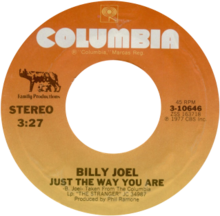
Turnstiles is the fourth studio album by American singer-songwriter Billy Joel, released May 19, 1976.

The Stranger is the fifth studio album by American singer-songwriter Billy Joel, released on September 29, 1977, by Columbia Records. It was the first of Joel's albums to be produced by Phil Ramone, with whom he would work for five subsequent albums.
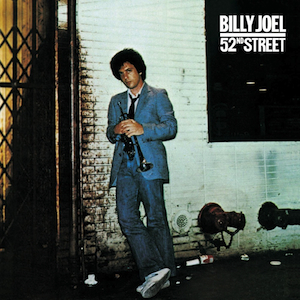
52nd Street is the sixth studio album by American singer-songwriter Billy Joel, released on October 11, 1978, by Columbia Records. Presenting itself as the follow-up to his breakthrough studio album, The Stranger, Joel tried to give the new album a fresh sound, hiring various jazz musicians to differentiate it from his previous studio albums.

Songs in the Attic is the first live album by Billy Joel, released in 1981.

"Movin' Out (Anthony's Song)" is a song written and recorded by Billy Joel originally appeared on his 1977 album The Stranger as its opening track.

"Piano Man" is a song written and performed by American singer-songwriter Billy Joel. First released as a single in the US on November 2, 1973, it was included on Joel's 1973 album Piano Man. The song is sung from the point of view of a piano player at a bar, describing the patrons. "Piano Man" is based on Joel's real-life experiences as a lounge musician in Los Angeles from 1972 to 1973, which he had decided to pursue in an effort to escape his contracted New York City–based record company at the time, Family Productions, following the poor commercial performance of the album Cold Spring Harbor.

"Only the Good Die Young" is a song written and recorded by Billy Joel from his fifth studio album The Stranger, released in 1978 as its third of four singles.

"You're Only Human (Second Wind)" is a song written and performed by Billy Joel that originally appeared on Greatest Hits – Volume I & Volume II in 1985. The song deals with teenage depression and suicide. It became a top-ten hit, peaking at No. 9 on the Billboard Hot 100.
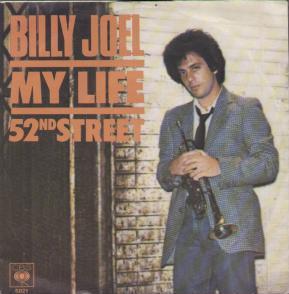
"My Life" is a song by Billy Joel that first appeared on his 1978 album 52nd Street. A single version was released in the fall of 1978 and reached No. 2 on the U.S. adult contemporary chart. Early the next year, it peaked at No. 3 on the Billboard Hot 100.

"How Long" is the debut single by the English band Ace, from their 1974 debut album, Five-A-Side. It reached No. 3 on both the US and Canadian charts, and No. 20 on the UK Singles Chart.

"Honesty" is a song by American singer-songwriter Billy Joel, released by Columbia Records as the third US single from his sixth studio album 52nd Street (1978) in 1979. "Honesty" was solely written by Joel, while production was handled by Phil Ramone. The song appears on the Dutch and Japanese editions of Greatest Hits Volume 2, replacing "Don't Ask Me Why" (1980).

"It's Still Rock and Roll to Me" is a song written and performed by Billy Joel, from the hit album Glass Houses. Released in 1980, the song peaked at number 1 on the Billboard Hot 100 for two weeks, from July 19 through August 1, 1980, making it Joel's first number 1 hit single in the United States. The song spent 11 weeks in the top 10 and was the 7th biggest hit of 1980 according to American Top 40.

"You May Be Right" is a song written and performed by rock singer Billy Joel, released as a single and the opening track from his 1980 album Glass Houses. The single reached No. 7 on the US charts and No. 6 in Canada. It failed to chart, however, in the UK unlike his preceding and succeeding singles "All for Leyna" and "It's Still Rock and Roll to Me". The Japanese single features "Close to the Borderline" as a B-side.

"Don't Ask Me Why" is a 1980 song by Billy Joel released as the third single from the album Glass Houses. The song spent two weeks at number one on the Adult Contemporary chart and peaked at number 19 on the Billboard Hot 100.

"She's Always a Woman" is a song by Billy Joel from his 1977 album, The Stranger. The single peaked at No. 17 in the U.S. in Oct. 1978, and at No. 53 in the UK in 1986, when it was released as a double A-side with "Just the Way You Are". It re-entered the UK chart in 2010, reaching No. 29.
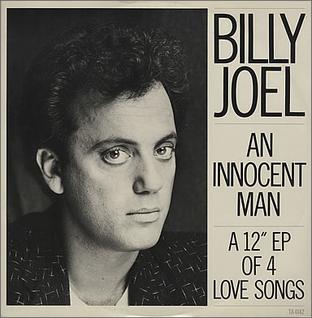
"An Innocent Man" is a 1983 song performed by Billy Joel released as the third single from his album of the same name. The song, whose musical style is an homage to Ben E. King and the Drifters, reached No. 10 on the Billboard Hot 100 chart, the third consecutive top 10 single from the album. It also spent one week at No. 1 on the Billboard adult contemporary chart.
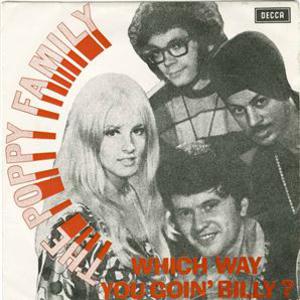
"Which Way You Goin' Billy?" is a song by the Canadian band the Poppy Family. First released as a single in 1969, it features on the album of the same name and was a chart-topping hit in Canada and Ireland. It was also a significant hit in other parts of the world, reaching #2 on both the U.S. Cash Box and Billboard pop charts.

"The Things We Do for Love" is a song by British band 10cc, released as a single in 1976. It later featured on the album Deceptive Bends released in 1977 and was the group's first release after the departure of band members Kevin Godley and Lol Creme.

The Lords of 52nd Street is a rock band that primarily comprises members of the line-up which backed singer-songwriter Billy Joel from 1976 to 1981, the period during which Joel initiated a run of albums that reached the top ten on the Billboard charts.
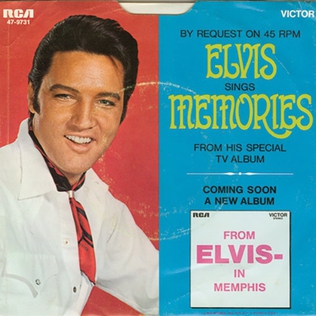
"Memories" is a 1968 song originally recorded by Elvis Presley.
